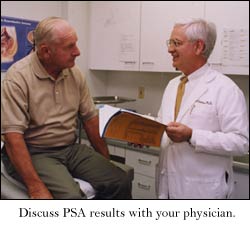PSA Tests Are Not All the Same
 In recent years, patients, physicians, and clinical laboratories have become increasingly aware of differences in PSA results when the same patient has more than one test and those blood samples have been sent to different laboratories.
In recent years, patients, physicians, and clinical laboratories have become increasingly aware of differences in PSA results when the same patient has more than one test and those blood samples have been sent to different laboratories.
It is becoming evident that, in many instances, the differences in reported values are due primarily to differences in the standardization of different PSA tests.
In addition to an overall PSA value, physicians now more frequently use PSA derivatives to make a more informed decision about the risk of cancer and the need for a biopsy.
Examples of derivatives are: PSA velocity, PSA doubling time, PSA density, and free/total PSA ratios.
For all of these measurements, accuracy and consistency of PSA results is very important.
Today, two different standards – Hybritech and WHO (World Health Organization) – exist for measuring PSA levels, and these standards do not produce equivalent results.
Most importantly, lower PSA results with WHO standardization can lead to different diagnostic and clinical outcomes.
In a study in which a screening population of 2,300 men was tested using the Hybritech and WHO standards, the WHO tests yielded PSA levels approximately 23% lower than the Hybritech ones.
Whether using the 2.5 ng/mL or the 4.0 ng/mL cutoff for recommending biopsy, the Hybritech-standardized test detected approximately 5% more men who would have been recommended for biopsy compared to the WHO standardized test.
Consistent PSA measurements are essential to biopsy and treatment recommendations.
In addition, comparisons of a man’s PSA over time are becoming increasingly useful as an aid to early diagnosis. In particular PSA velocity or doubling time are being used in clinical trials and screening programs.
Results from different PSA standards affect interpretation of scores at all levels.
PSA above 10 ng/mL to 20 ng/mL indicate a strong probability of cancer, and almost always result in a recommendation for prostate biopsy.
Men with a PSA level between 4 ng/mL and 10 ng/mL have a greater than 40% chance of having prostate cancer detected.
 Cancer having features associated with clinically significant disease also have been detected in 15% to 25% of men with PSA values between 2.5 ng/mL and 4 ng/mL , and approximately 20% of these cancers are aggressive, high Gleason grade tumors.
Cancer having features associated with clinically significant disease also have been detected in 15% to 25% of men with PSA values between 2.5 ng/mL and 4 ng/mL , and approximately 20% of these cancers are aggressive, high Gleason grade tumors.
A cutoff of 2.5 ng/mL for prostate biopsy has been recommended by several investigators and recently was recommended in guidelines established by the National Comprehensive Cancer Network (NCCN). The American Cancer Society guidelines also recommend considering a biopsy if the PSA is higher than 2.5 ng/mL.
The common factor in all of these considerations is that the PSA value determined in any range is influenced by standardization of the test.
Perhaps more importantly, PSA velocity or PSA doubling time are also affected by differences in standardization. The most obvious example, the rise in PSA over time, may appear much faster or slower if two different PSA tests are used in the same patient.
Thus, a PSA test’s standardization can affect both the cutoff level and what constitutes a worrisome PSA velocity.
Every aspect of PSA diagnostics, including follow-up tests after treatment, ultimately relies on the standardization of the individual test results relative to previously established clinical decision points.
Consistent PSA measurements are essential, and must be used intelligently to make valid biopsy and treatment recommendations.
Physicians and patients need to be aware of which standard is being used to measure their PSA so that their results can be interpreted correctly for biopsy recommendation, to assess the aggressiveness of the tumor, to select the patient for inclusion in a clinical trial, and interpret the response to therapy.
Manufacturers of PSA tests and clinical laboratories may need to report the standardization method used for that test and perhaps even provide the result that would be obtained with the alternate standard.











